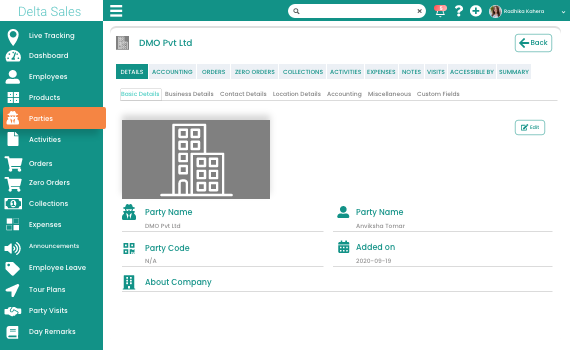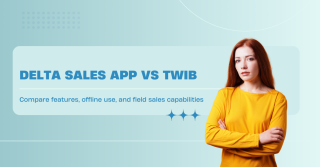Why Every Field Sales Rep Needs a Mobile Sales CRM in 2025

Field sales have historically been difficult. Sales representatives typically spend a lot of time traveling, managing client meetings, processing orders, maintaining records, and addressing customer questions, all while working towards their goals. A mobile sales CRM is now crucial to handle these requirements, giving reps the necessary tools to work productively, stay organized, and provide customized customer experiences.
In a fierce market, quickness, precision, and fast insight into sales distinguish the best sales reps. Old‑school tools such as spreadsheets, hand‑crafted reports, or outdated desktop CRMs can’t meet those needs.
This article explores how field sales management apps and mobile CRM apps are transforming the field sales landscape, the key benefits they offer to both sales reps and organizations, and why they are critical for building a more agile and data-driven sales force.
How the Mobile CRM Trend is Reshaping Sales Teams
Initially, CRM platforms were created mainly for desktop use, serving office personnel. However, this arrangement often caused problems for field sales reps, who struggled to access key customer information while away from their desks and meeting clients.
The sales industry has now moved to a mobile‑first CRM strategy. Field sales teams need real‑time access to client data, quick communication with supervisors, and user‑friendly tools for entering and updating information. This shift has driven the expansion of mobile‑focused sales CRMs, designed specifically for representatives who spend most of their time away from a desk.
In contrast to standard CRMs, mobile CRM programs provide offline capabilities, sales rep GPS monitoring, route planning tools, and fast data input features. These programs link field representatives with central offices, enabling seamless information exchange that enhances efficiency, accountability, and overall outcomes.
Top Reasons Field Sales Reps Must Use a Mobile Sales CRM in 2025
1. Work Anywhere, Anytime with Mobile-First Access
Sales reps hardly ever stay at a desk. They're constantly on the go, meeting store owners, distributors, and customers. With a mobile CRM, they can instantly pull the latest client data, order histories, and product details straight from their smartphones.
This mobile‑first approach removes the need for laptops or trips back to the office. Whether they're in a remote village with spotty internet or a bustling city market, a rep can log orders, record visits, and manage tasks while out in the field.
2. Real-Time Data for Smarter Decisions
In field sales automation, timing is essential for success. A cloud‑based CRM gives reps and managers instant insight into sales actions, pending orders, customer contacts, and goal performance.
For example, when a store faces a stockout, a rep can quickly check the inventory system, confirm with the supplier, and ship the order, all within minutes. Likewise, managers can track progress live and deliver data‑backed guidance to their teams.
Such real‑time visibility eliminates guesswork, enabling reps to make swift, informed decisions.
3. Productivity Doesn’t Stop in Low Network Areas
A major obstacle for field sales reps is inconsistent internet connectivity. Many high‑potential regions are in underdeveloped or rural areas where the connection is spotty.
A CRM designed for sales teams with offline capabilities makes sure work doesn't halt when the connection fails. Representatives can continue gathering client details, handling orders, and taking notes while offline. When the connection returns, everything automatically syncs with the system.
This guarantees uninterrupted output and prevents any data loss.
4. Smarter Route Planning Saves Time
For field sales reps, effective time management is essential. Hours lost to traffic or poorly planned routes can translate into missed sales opportunities.
Mobile sales tracking apps include route planning features that assist reps in planning their days efficiently. They can:
-
Find the most efficient paths
-
Give priority to key clients
-
Visit more stores in less time
This cuts travel costs and lets reps focus on selling and building relationships rather than dealing with logistics.
5. Instant Order Processing and Inventory Updates
Collecting orders on paper is sluggish, prone to errors, and frustrating for sales reps and customers. With a mobile sales app, reps can capture orders on their phones, view live inventory, and generate invoices instantly.
This cuts down on human errors, speeds up the ordering workflow, and boosts client satisfaction. It also alerts managers and distributors instantly about demand, helping prevent stockouts and streamlining distribution management effectively.
6. Better Visibility and Accountability
Supervisors often struggle to see what’s actually happening out in the field. Are sales reps meeting with the right customers? Are they hitting their daily quotas? How much time do they spend on each visit?
A CRM that includes GPS tracking, geo‑tagged photos, and visit logs gives managers full insight into field activity. This level of transparency fosters accountability among reps and lessens the need for micromanagement.
At the same time, reps gain clear visibility—they can instantly view their exact targets, schedules, and performance metrics.
7. Stronger Customer Relationships

Sales isn’t merely about closing deals; it’s about cultivating lasting relationships. Customers expect representatives to be familiar with their history, preferences, and previous interactions.
A mobile customer relationship management tool equips reps with this information at their fingertips. Before walking into a client meeting, a rep can quickly check:
-
Last order details
-
Payment history
-
Customer preferences
-
Pending complaints
This empowers bespoke conversations that enhance confidence and allegiance, ultimately driving greater client retention.
8. Seamless Collaboration with Teams
Sales reps aren’t isolated; they constantly collaborate with managers, distributors, and teammates. A sales‑collaboration platform delivers integrated communication and shared‑task tools such as instant chat, photo sharing, and activity tracking.
This creates a live link between field agents and headquarters, guaranteeing swift problem resolution, faster approvals, and a unified approach to executing the sales strategy.
9. Actionable Insights Through Analytics
Collecting data is essential, but the real value lies in turning it into actionable insights. A sales CRM equipped with analytics does more than merely store customer interactions and past purchases; it also examines and interprets that information.
Through automated reports & analytics, sales teams and leaders can determine:
-
Best-selling products
-
Seasonal sales patterns
-
Areas with the highest sales
-
Customers who might churn
This insight enables sales reps to tailor their sales strategies, focus on the most lucrative prospects, and promote sustainable growth.
10. Future-Proofing Sales with AI and Automation
2025 places intelligence at the forefront rather than merely facilitating movement. Today's AI‑enhanced CRM solutions come equipped with sophisticated features such as predictive analytics and automated workflows.
Envision a mobile CRM that:
- Recommends the most pertinent customer to target
- Anticipates which clients are likely to make larger purchases
- Takes care of routine reporting automatically
- Notifies reps about potential upsell opportunities
This level of automation not only frees up time but also upgrades field representatives into more insightful, strategic specialists.
How a Mobile Sales CRM Benefits Both Reps and Organizations
Benefits for Reps:
-
Convenient mobile access to customer data.
-
Accelerated order handling via sales automation.
-
Optimized routing for effective client coverage.
-
Tailored customer interactions that foster loyalty.
-
Transparent view of sales goals and KPIs.
-
Real‑time seamless teamwork.
Benefits for Organizations:
-
Consolidated sales data reporting and analysis.
-
Greater visibility throughout the supply chain.
-
Lowered operational expenses thanks to automation.
-
Higher retention through steady, personalized service.
-
Improved monitoring of field‑sales productivity.
By giving sales reps the right tools, companies create a win‑win: more satisfied reps who can work more efficiently, and businesses that enjoy stronger sales performance and higher customer satisfaction.
Final Thoughts
Modern sales demand agility, data‑driven decision‑making, and a customer‑first mindset. A mobile sales CRM offers all of that and more, empowering field reps to work more efficiently, nurture relationships, and close deals faster.
For sales representatives, it’s the essential tool for cutting waste and zeroing in on what truly matters - cultivating robust customer relationships and driving growth. For companies, it forms the backbone of a streamlined, automated sales engine.
Ready to transform your field sales operations? Book a demo with Delta Sales App today and see how a mobile sales CRM can elevate your team’s performance.








